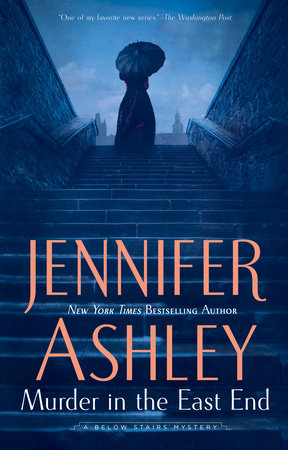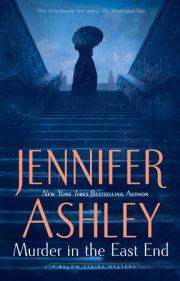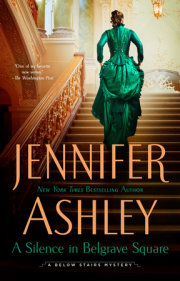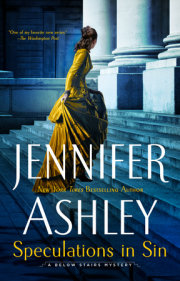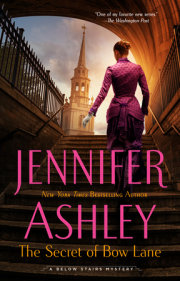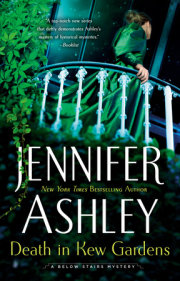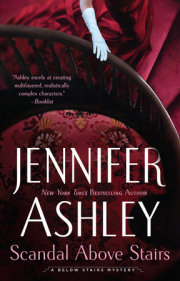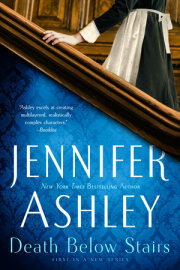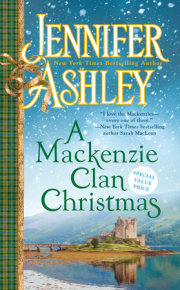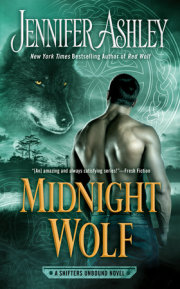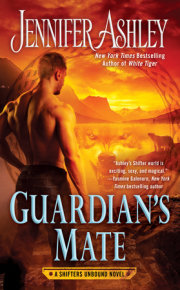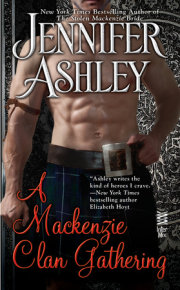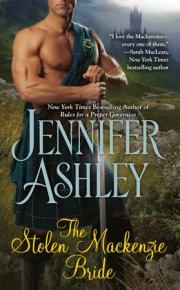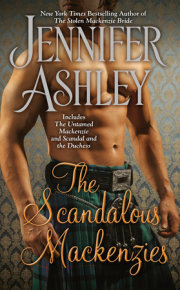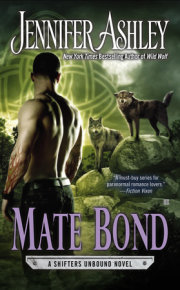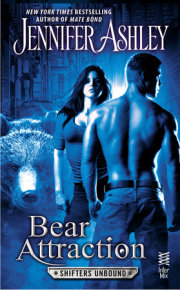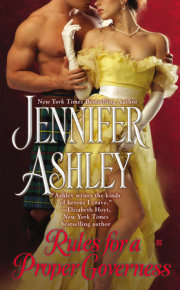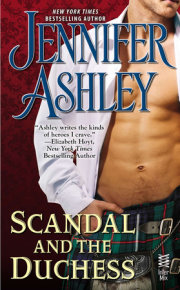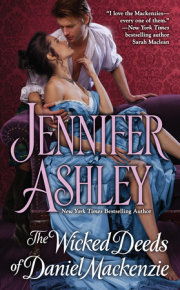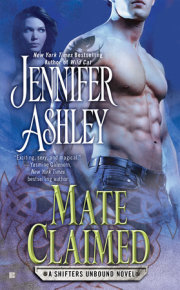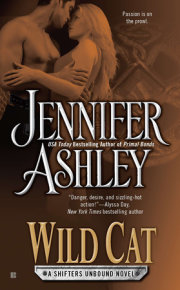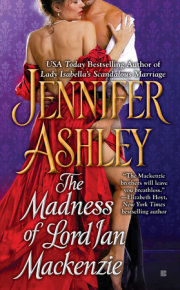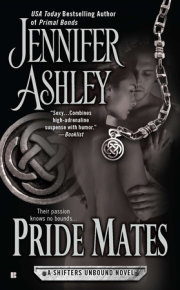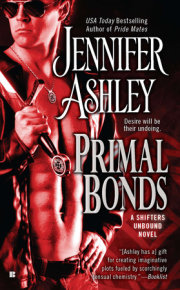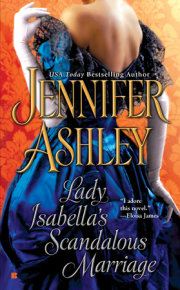1
February 1882
He's asking for you, Mrs. H."
Ordinarily, these words, spoken by a lad called James, the son of my dear friend, Daniel McAdam, would give me a flutter of pleasant anticipation. I hadn't spoken to Daniel in several long weeks, as he'd been traveling, this time to Ireland.
Tonight, however, Daniel would have to wait. The kitchen of the Mount Street house where I was cook boiled with activity, the oven hot as a blacksmith's forge, as I turned out meats, puddings, and tasty sauces as quickly as my assistant, Tess, and I could make them. The odors of roasted flesh and burned sugar competed with that of boiling vegetables and sautéed fish. I'd recruited Charlie, the boy who tended the fires, to help with peeling and chopping. Maids and footmen streamed to and fro, and Elsie, the scullery maid, washed dishes with the vigor of a sailor swabbing down a deck.
"He is most inconvenient, your father," I called to James as I ladled pan juices over a roasted duck on a platter and arranged boiled new potatoes around it. "Please tell him Mrs. Bywater decided to host a supper ball, of all things, with half a week's notice. A great part of Mayfair is upstairs now, trying to waltz in what's meant to be the parlor. Food must flow, Mrs. Bywater said, as though I am a fish-and-chips man." I slammed the spoon back into the pan and shoved it at Elsie, who fled with it to the scullery.
James took no offense at my brisk words. He sidestepped out of Elsie's way then helped her balance the pan on the way to the sink, to her delight.
"When service is done, he means," James said cheerily over his shoulder. "Anything I can do to help, Mrs. H.?"
He was a lovely young man. Going on seventeen now, James was a good foot taller than he'd been when I'd first met him. I was pleased to see that his coat and trousers covered his long arms and legs, new clothes if I were any judge, or at least sturdy secondhand ones.
I wiped my sleeve over my sweat-streaked face. "Take the other end of this platter, and we'll haul it to the dumbwaiter. And for heaven's sake spill nothing. A day's work, this is."
James lifted his end of the duck's tray robustly, the lad strong, and it nearly tilted out of my hands. I gave him an exasperated look, and he grinned and eased the platter down to my height.
We had the duck safely into the lift at last, and James cranked the ropes to haul it upstairs. I could only hope that the footmen above who retrieved it treated it with care.
James lingered, and so I used him shamelessly. Another pair of hands was not unwelcome.
Tess and I had spent much of yesterday making a large layer cake with icing and spun sugar decorations. I entered the larder, where I'd stored it, and of course found the cake sagging in the middle, the icing and sugar half-melted and broken. My shriek brought Tess running. When she saw the wreck, she stared in dismay, her language burning the air.
I hadn't the heart to admonish her for her curses. Many of the words she used were ones that leapt readily to my mind.
"Never mind," I shouted over her. "We must send something. Help me."
In the next half hour we worked a miracle of sorts. Into the dumbwaiter went a large apple charlotte thrown together from apples I'd cooked down earlier in the day along with ladyfingers left over in the larder. I surrounded this with plates of macaroons for those with daintier appetites and the rhubarb tart I'd made for the staff. It had been meant as a treat after our hard work, but needs must.
Once all the food was gone, Tess and I could not collapse, because the kitchen had to be thoroughly cleaned and organized for the morrow. I'd have to cook for the family and any guests all the next day, not to mention the servants.
James vanished somewhere in the process, but I didn't begrudge him his escape.
As I scrubbed down the work table, removing every bit of flour, grease, grit, and meat juices so I'd have a clean surface tomorrow, one of the footmen bounded into the kitchen, out of breath.
He was new-footmen here tended to come and go. Mrs. Bywater had a penny-pinching nature, and an employer had to pay an extra tax on male servants of any kind, as they were considered a luxury. Therefore, she encouraged the lads to seek employment in other houses once they had a bit of experience, while the maids took on the extra work. Of the footmen who'd been here when I'd first arrived, only Paul remained.
This footman, who went by the name of Hector, ran headlong into the kitchen then stopped short, no doubt remembering my admonishments not to blunder through my territory.
"They're asking for you, Mrs. Holloway," he said, eyes wide. "The upstairs."
I continued to scrub, seeing no reason for excitability. "To do what, precisely? If they wish me to send up more dishes, they will have to wait a few minutes. I'm behindhand."
Hector stared in confusion. I did not think this young man would last long under the firm hand of Mr. Davis, our butler, nor the keen eye of the new housekeeper, Mrs. Redfern.
"I mean they're asking you to come up. Mr. Davis sent me to fetch you."
"Ooh." Tess, her temper restored, looked up from scraping out a bowl that had held pureed potatoes. "I wager they want you to take your bow, Mrs. H."
Cooks generally remained anonymous in the kitchen, which I preferred, but every once in a while were summoned to the dining room, where the master or mistress, or her guests, could thank her for the meal. Or, dress her down for her shortcomings-either could be the case.
I disliked these rare summonses above stairs, preferring to remain in the kitchen to get on with my job. But the mistress decided whether I kept my employment or was turned out, so I sighed, removed my apron, and tried to smooth my hair.
Another reason I disliked being summoned to the dining room was that cooking left me sweaty, grimy, and mussed. I brushed off my sleeves as best I could and straightened my cap.
"Wait." Tess grabbed me, wet her thumb in her mouth, and rubbed at a smudge on my cheek. "There," she proclaimed. "You're perfect. Maybe one of them will give you a vail."
Guests did sometimes hand a servant who pleased them a coin. These tokens I did not mind-an unmarried woman with a growing daughter cannot turn up her nose at an extra bob or two. But to stand in front of company while they scrutinized me was not to my taste.
Once Tess released me, upstairs I went.
The back stairs emerged in the rear of the house, the door opening to a wide hall leading to the front. The house had once been two, the walls knocked out by a previous owner to create one great mansion.
Guests thronged the house tonight, filling the hall and moving between rooms. Few noticed me appear, and those who did gave me no acknowledgment or even curiosity. A domestic was hardly worth a glance.
Mr. Davis spied me and beckoned me into the dining room. The dining table had been turned into a sideboard, filled with food that guests could take to other parts of the house.
Mr. Davis's dark hair shone with pomade, his hairpiece perfectly aligned, his swallow-tailed coat an example of excellent tailoring. He addressed Mrs. Bywater, who hovered with a cluster of guests near the table, the remains of my feast, including the roast duck, upon it.
"Mrs. Holloway, ma'am," Mr. Davis announced.
Mrs. Bywater, who prided herself on dressing like a prudent matron, wore a plain maroon gown and a sort of bag on her head that was meant to be a turban. Her friends were rather more fashionably dressed, a few in the black or gray of mourning or half mourning.
"Here is our cook," Mrs. Bywater declared. "Responsible for our excellent meal."
The group around her burst into polite applause. I curtsied, trying to look grateful, hiding my discomfort.
One of the ladies, her gray hair in tight ringlets, lifted a lorgnette to peer at me. "It must be a frightful expense to employ her."
"We are frugal with the household budget." Mrs. Bywater managed to look proud and humble at the same time. "Much can be done with careful planning. Mrs. Holloway is clever with her purchases."
This was the first time my employer had admitted such a thing about me, though I did not take her compliments as they were. I knew she spoke to impress her friends.
"She is very young." The lorgnette flashed as it moved over my person. "I prefer a stout woman with plenty of gray hair. You'd know she had experience. This one cannot be much into her twenties."
Mr. Davis radiated silent disapproval, considering it gauche for the mistress to discuss not only expenses, but the staff, especially in front of other staff.
I was young, it was true, especially to be a cook in an elegant Mayfair household. The Mrs. appended to my name was a sign of respect given to senior female servants, and if people assumed I had once been married, I said nothing to dissuade them.
A new voice joined the conversation. "Mrs. Holloway is thirty. A fine age, I think."
Lady Cynthia Shires, niece to Mr. Bywater and daughter of an earl, halted near Mrs. Bywater and gave the lorgnette lady a look of frank assessment.
I hid my surprise when she came into view. Cynthia had dressed, uncharacteristically, in a frock more beautiful than any in the room. She had recently come out of mourning for her sister, and her evening gown had plenty of colors to make up for her previous lack of them-a deep pink bodice and a cream silk skirt, which was gathered back into a small train and trimmed with ruched ribbon and cloth roses.
She wore her golden hair in its usual unadorned knot, simple elegance in a room filled with diamond-studded turbans, flower-filled bandeaus, and braids and false curls festooned with feathers.
Cynthia met my gaze, a mischievous twinkle in her eyes. That Cynthia, who preferred to lounge about the house in a man's suit, had donned such a splendid dress meant she was up to something.
A young woman joined Cynthia, sliding her hand into the crook of Cynthia's arm. She was dark-haired and a beauty.
The term beauty is bandied about without discretion, in my opinion, when every young lady who makes her bow is termed so, regardless of her true looks, but this woman was an exception.
The lady was about the same age I was, by my guess. Her very dark hair was dressed in curls at the base of her neck, bound with a thin gold chain. Her cream-colored gown was subdued, its bustle small and without the masses of ribbons, embroidery, or appliqué that other ladies wore tonight. It was a ball dress, no doubt, but a tastefully made and subtle one.
"The lobster rissoles were excellent, Mrs. Holloway," the young woman said to me.
I curtsied to her diffidently but did not speak. I should only answer when asked a direct question.
"I have not tasted such splendid food in an age," she continued. "A fine treat."
I nodded my thanks, attempting to keep my eyes averted as a proper servant ought, but I shot her a glance of curiosity. I had no idea who she was, but from the way she hung on Cynthia's arm, the two were close friends.
The lady studied me with openness, but in a far more courteous manner than the lorgnette woman. Another difference between this lovely lady and the others in the room was that she spoke directly to me and used my name.
Mrs. Bywater seemed to think I'd had enough praise for one night. "Thank you, Mrs. Holloway," she said in a tone that meant I was dismissed.
I curtsied to the company, darted a last look at Cynthia's friend, and walked sedately from the room. No scurrying back to my hole. I departed with my head high, dignity in place, accepting the praise for my hard work without false modesty.
I could have wished for a coin or two, however. Compliments are all very well, but shillings and pence are far more welcome.
Not until after midnight did I have the chance to hang up my apron, scrub my hands and face in the scullery sink, don coat and hat, and depart to meet Daniel.
February rain poured outside, rendering the night cold and dank. I pulled on gloves and ducked my head against the spattering drops as I hurried into the street.
Little traffic, foot or carriage, roamed on this wet night, the residents of Mount Street wisely remaining indoors. I too ought to have stayed at home to snatch a few hours of sleep, giving Daniel my apologies when I saw him again.
It was a testimony to my curiosity and my fondness for Daniel that I scurried, head bowed, along South Audley Street toward Grosvenor Chapel. James had told me his father would await me there.
I doubted James meant in the chapel itself, which was shut. I made my way along a passage that edged the graceful church and ended at a gate to a green.
I hoped Daniel did not wish to have a conversation on the grass. It was dreadfully wet, and I felt a sneeze coming on.
"Kat."
He was behind me. I swung around, dismayed by how lighthearted Daniel's voice rendered me. I told myself this was because I had not seen him in many weeks, and I naturally was glad to see him.
He stood in an open doorway, outlined by light, which proved the chapel was not shut entirely.
"My dear Kat, come in out of the rain," Daniel said, reaching for me. "Next time, tell James you wish me to the devil and stay home."
He caught my hand and pulled me into the lighted space, shutting the door behind us. I found myself in a small room lined with cupboards and robes on hooks-the sacristy, I believed it was called. The room had no stove, but me absence of chill wind and rain came as a relief.
Daniel wore his working clothes-wool coat patched at the elbows, linen shirt, knee breeches shiny with wear, and heavy boots. He'd removed his cap, showing me that his dark brown hair had grown even longer during his absence.
At least he was Daniel tonight, meaning I did not have to pretend I knew him as a City gent, or a pawnbroker’s assistant, or whoever else he’d decided to be. He disguised himself whenever he worked for the police, but I preferred him as the deliveryman I’d first met a few years ago, who’d heaved a heavy sack to the kitchen floor and given me a smile I never forgot.
“Such language in a church,” I said, disengaging my hand. “I knew you’d not have asked for me if it hadn’t been frightfully important.”
“True. I know you have little time to spare.” His crooked grin was as self-deprecating as ever.
I shook rain from my skirts. “Well, you’d better tell me what you wish to say. I need to make an early start.”
What I wished him to say was that he’d missed me. Perhaps he’d kiss me, and I’d go home warm.
I was a bit disappointed, therefore, when Daniel said, “I need you to meet someone.”
He crossed the room and opened the far door, sticking his head through and speaking words too quiet for me to discern.
The door opened wider to admit a man I’d never seen before. He was as tall as Daniel and as bulky, but there the resemblance ended. Where Daniel’s face was hard and square, this man had narrow cheeks and regular features, so regular they made him quite handsome. His dark hair was neatly trimmed and slicked back from his face, and he had a beard, also neatly trimmed, short and brown.
Instead of a workman’s clothes, he wore a dark suit with a dog collar—a white starched strip around his neck that proclaimed him one of the clergy.
“Mrs. Holloway,” Daniel said, a coolness entering his tone, “may I present the Reverend Errol Fielding.” He paused. “My brother.”
Copyright © 2020 by Jennifer Ashley. All rights reserved. No part of this excerpt may be reproduced or reprinted without permission in writing from the publisher.

